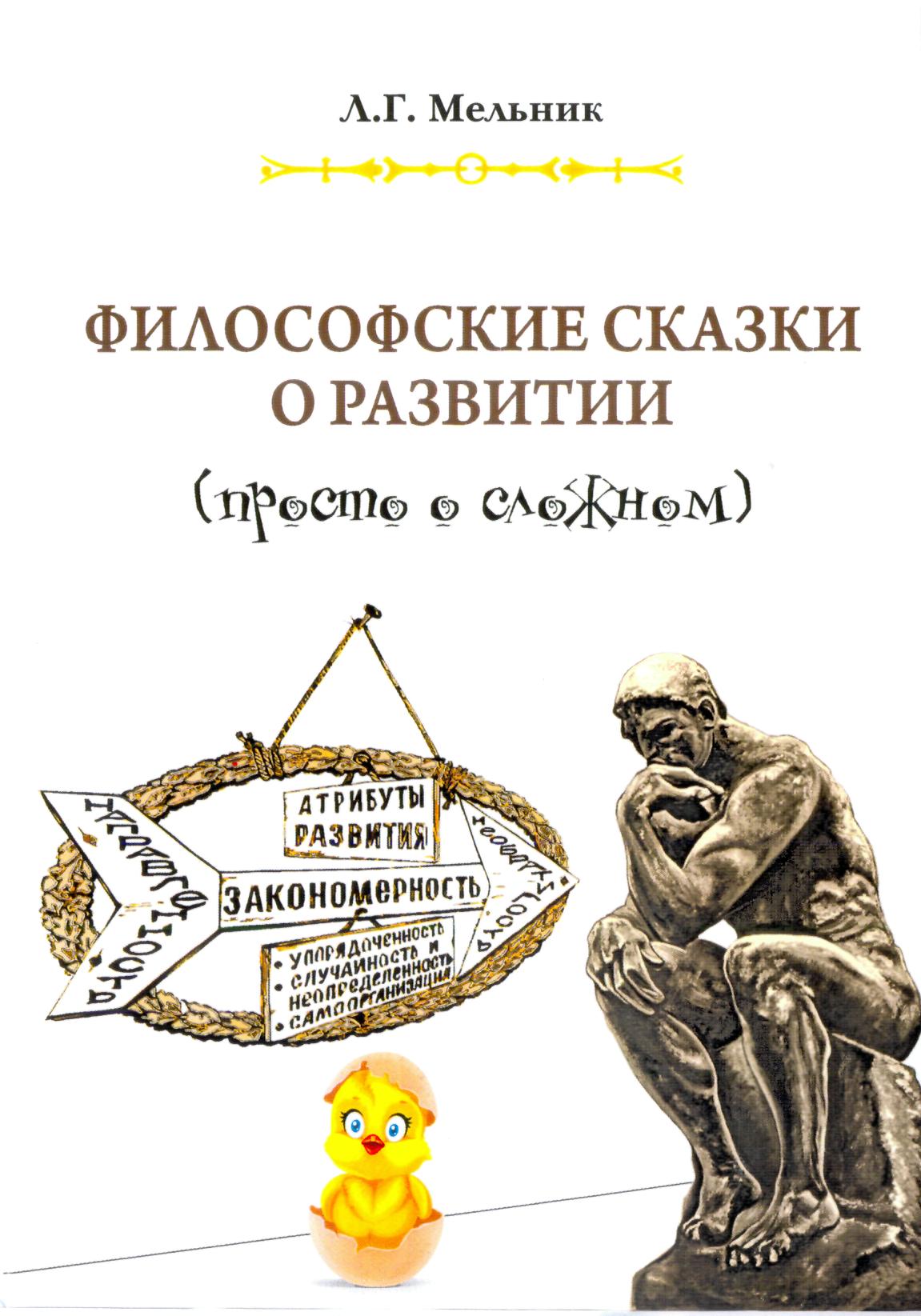| NEW BOOKS: PHILOSOPHIC TALES … – COMPLEX THINGS IN SIMPLE WAY… |
|
Recently a new book by Doctor of Economics, Professor L.G. Melnyk (Head of the Department of Economics and Business Administration at Sumy State University, Director of the Research Institute for Development Economics of National Academy of Sciences and Ministry of Education and Science of Ukraine), “Philosophic Tales about Development (complex things in simple way)” – Sumy: University Book, 2015. – 382 p. has been published. In a concise summary of the book we read: In a popular form fairy tales, parables, anecdotes and poems illustrate basic laws of systems development. In particular, deep sense of key issues is revealed: origins and mechanisms of systems formation, logics and material-information basis of development processes, the role of a man in evolution phenomenon, and the essence of such phenomenon as sustainable development. In addition to author’s material the book presents fragments of art works of famous authors, as well as abstracts from scientific papers of famous scientists. Citations of leading scientists are used. The cover prepares the reader that in the book seemingly unconnected things are connected: unserious and serious, simple and complex, artistic and scientific. On the background of solid scientific attributes a funny chicken, which has only just seen the world looks at you with astonishment. It is a symbol of a new system, which will go through a difficult path of its self-organization and development. List of Chapters Chapter 1. Origins of Origins Chapter 2. Feeling the Matter Chapter 3. Grasping the Information Chapter 4. Forming the Memory Chapter 5. Assimilating the Systemic Thinking Chapter 6. Anatomy of Development Chapter 7. Dialectics of Creation Chapter 8. Mechanisms of Systems’ Development Chapter 9. Trialectics of Human Being Chapter 10. Sustainable Development
The detailed contents and some excerpts from the book on the link
THE REVIEWS AND FIRST READERS’ COMMENTS For those who still feel like a child, but have matured as a philosopher … Prof. L.G. Melnyk’s book “Philosophic Tales about Development (complex things in simple way)” is unique in its significance to activate transformative processes of thinking space of Ukraine. The scope of this work as a phenomenon is determined by deeper reasons than it seems at first glance. The book allows us to see significant driving forces of development not from logical and pragmatic thinking perspective, but from archetype image of the world and scientific truths perspective. Paying attention to the saying, “a fairy tale is a lie, but with a hint,” the author refers the reader’s unconscious, causing a special sense of responsibility for words in the broadest sense as an action that transforms the world. It should be emphasized that to speak simply about the complex is not given to everyone, but only those who have a special gift of understanding the world. No doubt, the author, who miraculously units synergetic intelligence, erudition and literary talent, refers to this cohort. Offered philosophical tales are not only for children. You could even say they are “tailored” for children to grow. Apparently, the main readers are adults, who still feel like a child, but already matured as a philosopher, thinking about life problems and development. Igor Bystryakov, Doctor of Economics, Professor (Kiev) The charge of positive energy The book is written in a living vivid language. It captures you reading from any page, although it requires adequate training of the reader … Deep thoughts, funny smart examples … Adults and children will find own zest in it, … but very individual. The same can be said about the representatives of different professions. The reader comprehends the knowledge about the biosphere, noosphere, system, systems thinking easy and as if playing. The book is full of irony and humor … … It charges you with a positive energy. Ludmila Panchenko, Candidate of Physics and Math’s Sciences (Sumy) … It leaves a feeling of happy peaceful placidity Simple human words: “To my grandchildren Daniel and Darian and their generation” are the dedication to a very charming and clever book by Professor L.G.Melnyk. Any parent’s heart understands them. But how much love and respect in them! In my opinion with such love and respect for readers of all ages a brilliant book “Philosophic Tales about Development (complex things in simple way)” is created. It subtly and wisely presents the reader in an unobtrusive accessible form, with timely stops for a breath from an array of information obtained, and when it is possible to gambol and laugh, and then calm down, pondering in reading. First of all, I adore Professor L.G. Melnyk’s very easy and understandable not professorial but playing manner to present the most difficult universe categories and of philosophical thoughts to a child’s mind. He carefully so as if not to frighten, calmly and clearly explain them. To be able to clearly answer your child to many questions surprisingly complex for adults and at the same time seeming very simple and understandable a child NEEDS to read this good book, that intelligence and wisdom after reading it gives you a feeling of happy peaceful placidity. We will try to pass it to our children and grandchildren! With admiration and gratitude, Oksana Veklich, Mother and Professor (Kiev) Complex context in simple form The title usually reflects the key points of its contents in a very concentrated form. New edition by Professor L.G. Melnyk from Sumy State University is not an exception. The title “Philosophic Tales about Development (complex things in simple way)” is eloquently. The combination of seemingly incompatible things “philosophic tales” indicates, on the one hand, the depth of the meaning and content of the proposed serious arguments, maxims, opinions and conclusions, and on the other their simple manner. It is often perceived as a fairy tale, especially by adults who have forgotten that in it there is the hint that is a lesson for good fellows. This “fairy-tale” allowed to collect on the same page well-known names from various time and space, without breaking semantic integrity. For example, in Chapter 1, “Origins of Origins” of the 1st part of the book under the heading “Reputable thoughts” Cicero, Stephen Hawking, Heraclitus, Gibran Kahlil Gibran, Goethe, Kozma Prutkov … gathered. From the variety of their statements, according to the author’s will, there is a harmonious view of nature and its secrets, which prepares the reader to meet the challenges that are relevant to science not only today. This technique is used in the following chapters. Changing genres of the material (in addition to fairy tales memo, an anecdote, a parable, poetic forms, popular expressions appear), but the author focuses our attention on the considered in this chapter problem from different points of view. What is the development of man and nature? Is it possible at all? What distinguishes the systemic system crisis from structural one? What is trialectics? What is in the backstage of information … You can go on and on a number of issues and causes that these problems arise, and to which the author tries to give and gives answers not in a standard, stereotyped (what is typical, as a rule, for scientific papers) bur original form, up to anecdotal, without losing however, philosophical depth and purpose of the scientific research. Certainly, the work done by G. L. Melnyk and reflected in the book was awarded by the State Fund for Fundamental Research of Ukraine in the competition of scientific and popular publications, jointly held with the Ministry of Education and Science of Ukraine and the National Academy of Science of Ukraine. “Philosophic Tales” promises a lot of unexpected food for thought to representatives of a wide variety of scientific fields and, of course, curious students. Vasyl’ Chubur, Editor in Chief newspaper “Resonance”, Member of the Writers’ Union of Ukraine (Sumy) Book-telescope The book “Philosophic Tales about Development” reminds a telescope … It means, that it can change its level, depending on the depth of knowledge of a particular reader. I read a few tales from the book to my five-year granddaughter. Especially she liked the “The tale about the talking flower” … Seven times she asked me to read this story, inexplicably finding in it something of her own: empathizing the characters, wondering something, laughing at something … Olha Belousova, teacher-philologist (Sumy) A new book by Professor L.G. Melnyk is an extraordinary and extremely important event, not only for the scientific community. Virtuoso made publishing project is implemented in a genre that is unique to the scientific literature. We are well aware that not only the content determines the shape and form and allows us to develop and enrich content. A popular style of presentation makes it possible to present scientific results in a new light and, therefore, to see what cannot be understood highlighted by a scientific “spotlight.” It is important that the book is extremely attractive for young people – generations of secondary and high school students. It will help them learn and understand what they read in any textbook and /or literary work. In my opinion, the book is interesting for adult readers, because it has the basic properties of bestseller. It is difficult not to read it. I wish success to the author of an excellent book for distributing it among the grateful readers! Victor Tarasevych, Doctor of Economics, Professor (Dnipropetrovsk)
An interesting, witty, “live” book. The collection of generations’ experience. With humor about serious things. Thank you very much for the opportunity to touch the eternal.
Regards, |

